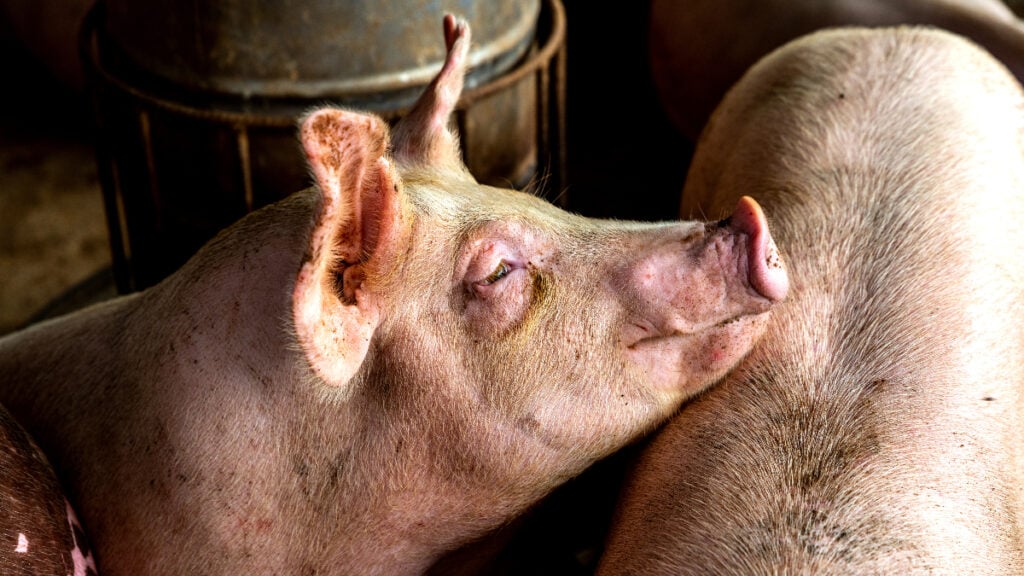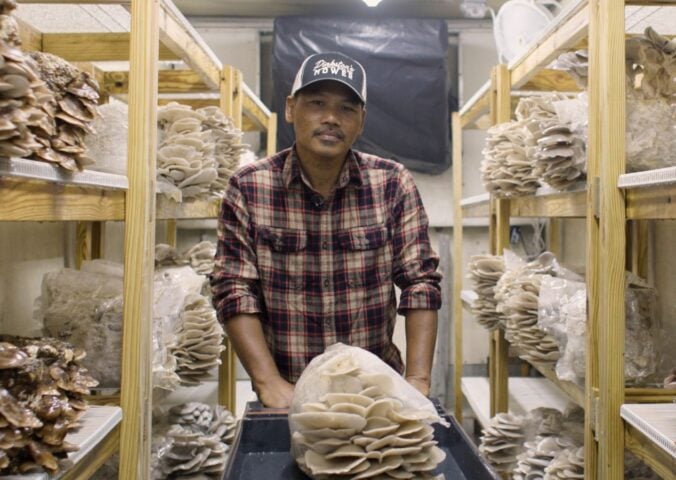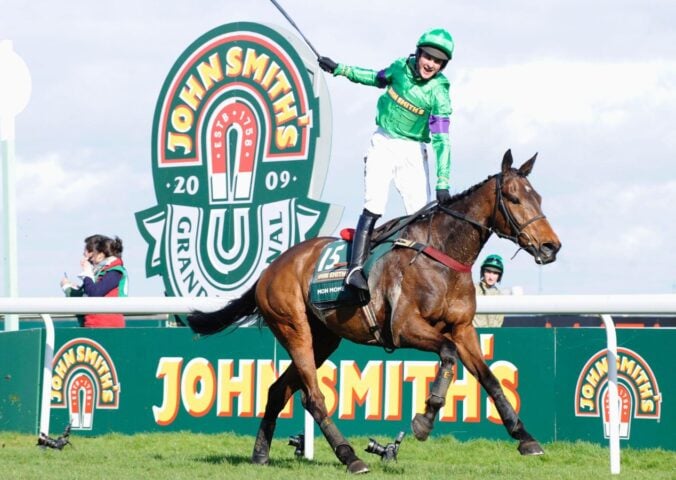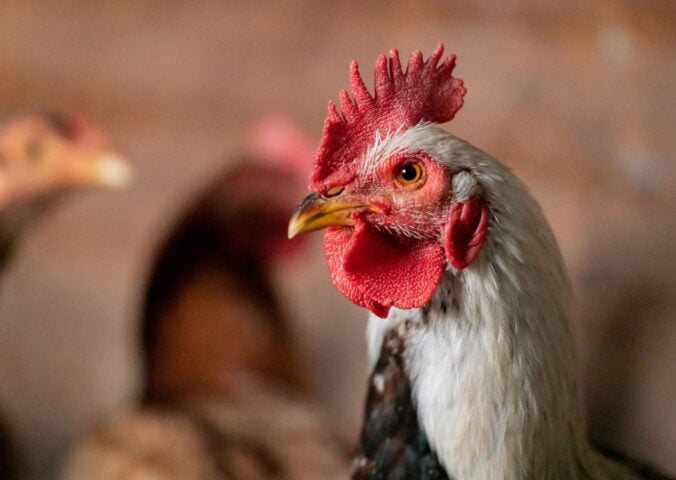“At some point, we have to recognize that these are not just bad apples but that the entire tree is rotten”, says Ed Winters of Surge. This is about horrific revelations earlier this month from an undercover investigation on a UK pig farm.
The investigation took place at Willerby Wold Piggeries in Yorkshire. The site supplied pork products to Morrisons, Tesco, Asda, and Sainsbury’s – that is, until the supermarkets saw what was happening.
The footage revealed animals sick, dying, or dead amid squalid living conditions where rotting carcasses were found throughout.
But this is not an isolated case.
Pig farms exposed
Just last month, another undercover investigation at intensive indoor farm P&G Sleigh Pig Unit in Aberdeenshire revealed ‘a number of serious legal violations’. The farm was supplying Lidl, Tesco, and Marks & Spencer.
In the last few years, the charity Animal Equality has investigated 10 pig farms.
One of which revealed pigs being beaten to death with hammers on a farm owned by the now-former chairman of Quality Meat Scotland.
Life for farmed pigs has never been good. But in the last decade the intensification of pig farming has led to more horrific treatment of these intelligent, sensitive, social animals.
Is pig farming in the UK now rotten to the core?
Intensive farming
There are over 220 intensive or ‘factory’ pig farms in the UK today. And there are over 250 industrial indoor units, up five percent since 2017.
The rise of intensive pig farming has been blamed for increases in sow deaths from prolapse. It’s also led to an increase in stress behaviors such as bar biting.
“Factory pig farming has become a race to the bottom in terms of animal welfare”
Alastair Kenneil, Farms Not Factories
There are also impacts on people and the planet.
Biodiversity is damaged from ammonia runoff, and impacts on communities include noise pollution, increased traffic, and the threat of air pollutants and viruses, including potential sources of the next pandemic.
“Factory pig farming has become a race to the bottom in terms of animal welfare,” explains Alastair Kenneil from the campaign group Farms Not Factories.
“Farmers are trying to survive falling prices, rising feed costs and cheap, low welfare imports from countries with lower (or non-existent) welfare standards. Trade deals with the US or Australia will further distort the market and drive more UK pig farmers out of business.”
But what is life like for the pigs?
Existing, not living
There are around 10 million pigs in the UK bred each year for food, from around 400,000 breeding sows.
This is down from 16 million (and 800,000 sows) in 1997. Pig meat is the most consumed ‘red’ meat in the UK, more than beef and lamb.
Around 90 percent of these pigs are raised on Red Tractor ‘assured’ farms.
Pigs can live on average around 5-10 years, although some are known to have lived until at least 25.
But in the farming system, most are slaughtered as infants.
Slaughtered as infants
According to the RSPCA: “Pork pigs for small joints and fresh meat are slaughtered at 15-16 weeks of age, whilst bacon pigs are slaughtered at 22 weeks of age.”
Over two million pigs die before even reaching slaughter.
Many of these deaths are from the horrific conditions seen at Willerby Wold, including injuries, illness, and neglect.
As the report says ‘the serious health and welfare issues on this farm are not unique’ with deformities and pigs cannibalizing each other being a common occurrence in pig farms.
For the vast majority of pigs, their short lives are full of pain.
Tail docking
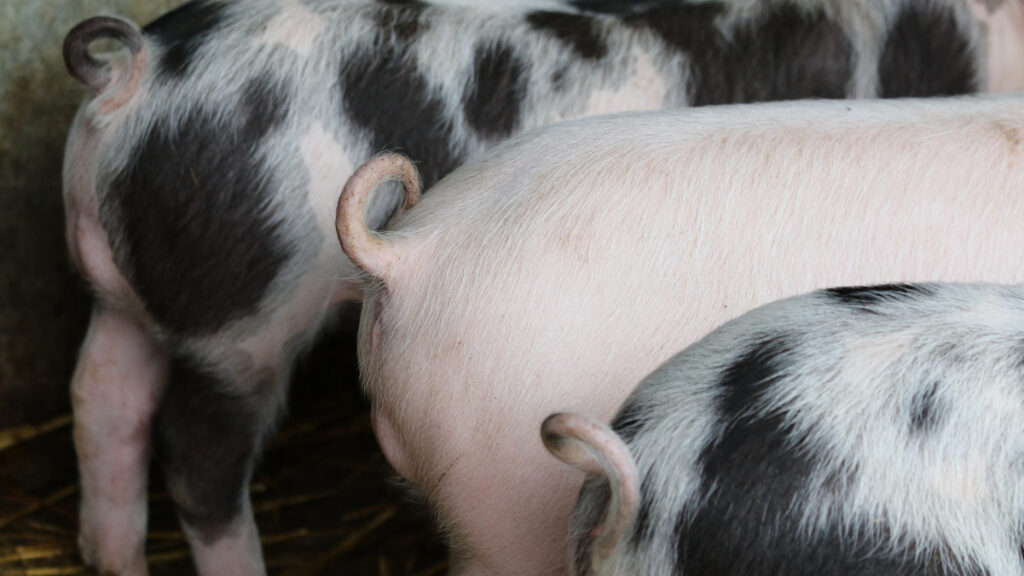
From birth, pigs are treated like commodities to improve profits and efficiency.
Despite it being prohibited under law, around 80 percent of piglets have their tails docked (cut off) shortly after birth, without anesthetic.
This is to prevent tail biting later on, which occurs when pigs are under physical or mental stress and fight each other in crowded conditions.
So their tails are docked painfully because the farmer wants to keep them in overcrowded, unnatural conditions, to increase profitability.
Environmental stimulation
“UK laws specify that pigs must have access to manipulable material to prevent tail-biting,” says Alastair Kenneil from Farms Not Factories.
He adds: “However many factory farms wrongly interpret this as being able to include toys such as plastic pipes hanging from the ceiling, rather than providing proper manipulable material such as deep straw bedding.”
This was a major factor in the devastating conditions found at Willerby Wold, according to vet Dr. Alice Brough.
In the investigation, there were very limited attempts to provide this legally required ‘manipulable material’ such as a single chain or alkathene pipe.
“The lack of enrichment is likely a factor in the widespread tail biting on the farm” says Dr. Brough.
Although she stresses that tail biting has multiple causal factors.
Teeth clipping
It is also illegal to ‘routinely’ clip or blunt pigs’ teeth.
Yet it is done on many pig farms – especially intensive farms – to prevent injuries from piglets fighting to access their mother sow’s teats.
Another undercover investigation from 2011 showed footage from a Somerset pig farm. Here, piglets had their teeth clipped off with metal pliers without anesthetic.
This is again a consequence of farming practices, as farmers engineer sows to breed more piglets than they can naturally feed.
Confinement in sheds
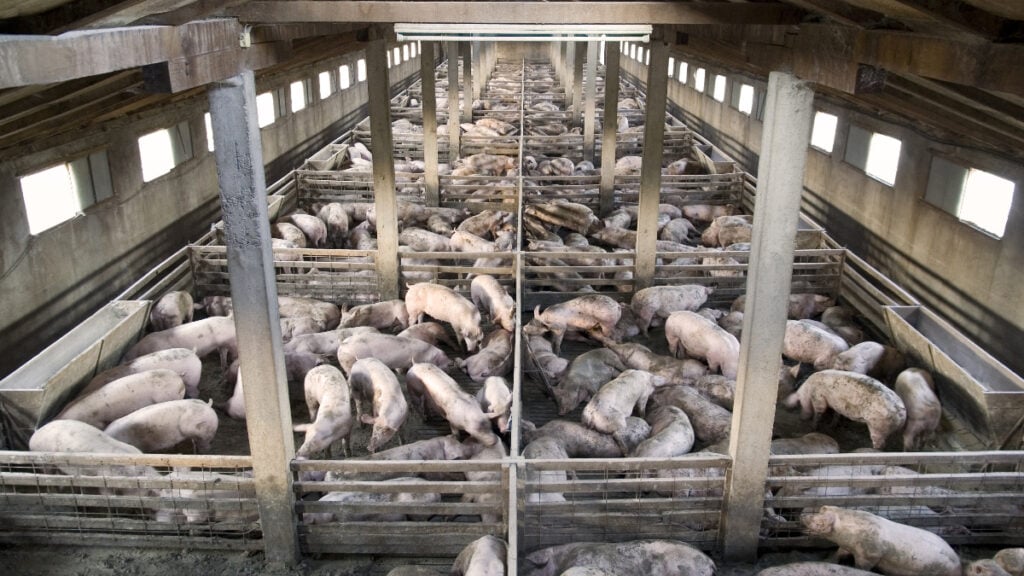
Most have rarely or never seen the outdoors.
Almost all pigs (96 percent) – including those born outdoors – are put into sheds for ‘finishing’ (preparation for slaughter).
Most live their entire lives in these concrete and metal hangars, similar to those at Willerby Wold.
“Intensive farmers see the pigs as capital-generating machines rather than living beings,” says academic Dr. Ekaterina Gladkova, whose research looks at the growing intensification of pig farming in Northern Ireland.
Farrowing crates
“Unbelievably, it is legal in the UK for mother pigs (sows) to be confined in a farrowing crate, a barren, steel cage too narrow for her to turn around, for five weeks in each pregnancy,” explains Kenneil.
“These crates cause lesions, cramps, muscle atrophy, pain and distress to the sows who cannot nurse their piglets and often suffer from bleeding gums caused by biting the bars in frustration and stress.”
Artificial insemination
Nearly all sows in intensive farming are artificially inseminated. While this is perfectly legal in the UK, it means sows do not get to choose when and with whom to mate.
Another 2015 undercover investigation on a Red Tractor Certified intensive pig farm in Humberside showed sows kept in ‘impregnation cages’.
They were covered in feces and flies, and piglets were kept in ‘battery cages’.
Within two weeks of a mother sow’s piglets being taken away, sows are artificially inseminated again to maintain profitability.
Gas chambers
Most pigs in the UK – 86 percent – are now slaughtered inside ‘humane’ gas chambers using carbon dioxide (CO2).
This involves lowering pigs into a gas chamber, where they panic, fight for breath and eventually suffocate.
It can take as long as 60 seconds for them to lose consciousness.
Animals Australia were the first to obtain footage from inside the gas chambers. The images are horrifying and distressing as the pigs panic to stay alive.
Outside Tulip Meats Slaughterhouse in Manchester, activists from Manchester Pig Save have long documented horrific scenes.
This includes the screams and cries of pigs as they’re lowered into the gas chambers.
The antibiotic threat
Last week, The Guardian revealed that UK pig farms have doubled their use of aminoglycosides.
It is a class of antibiotics critical for human health over the period 2015-2019 – all to keep pigs from being sick, and therefore profitable.
If antibiotics are fed to animals which humans then eat, the diseases they’re meant to protect humans from can become antibiotic-resistant.
As Cóilín Nunan, scientific adviser at campaign group Alliance to Save our Antibiotics, told the Guardian, reductions in antibiotic use could be achieved ‘if pigs are kept less intensively’.
RSPCA assured?
The pig industry and animal welfare charities have tried to reassure consumers. They claim the UK has the ‘highest welfare standards’ when it comes to farmed animals.
The RSPCA Assured scheme is meant to reassure consumers that pigs under its scheme are not tail docked. It is also meant to ensure they have adequate straw and bedding, and are not kept in cages.
Accreditation under RSPCA Assured schemes soared by 52 percent between 2016 and 2020. The label is recognised by 64 percent of young professionals and families. Nearly 4,000 farms, abattoirs, processors, and packers are members of its scheme.
But undercover investigations at RSPCA Assured farms have also revealed terrible conditions for animals. At Hoads Farm in East Sussex, investigators found squalid and cramped conditions, and corpses.
The RSPCA suspended Hoads Farm’s ‘high welfare’ status and undertook an investigation. However, it reinstated the farm to its scheme in February 2020.
“Lots of pigs under this scheme are routinely tail docked, and tail biting is not uncommon”, says Dr. Brough.
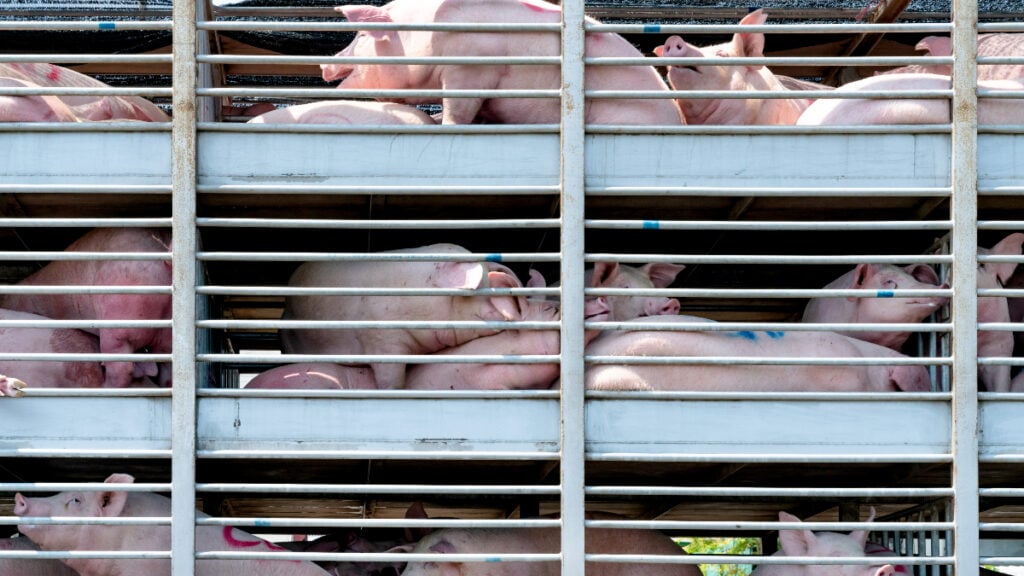
No enforcement
“Even RSPCA scheme standards say pigs can be given as little as 0.8 square meters each (a piece of flip chart paper is 0.7m2),” explains Jane Tredgett.
She is the founder of the campaign Scrap Factory Farming and a former RSPCA board member.
“Over 90 percent of the UK pigs and chickens are farmed in these sorts of conditions.”
“There is hardly any enforcement of pig welfare laws in the UK,” continues Kenneil from Farms Not Factories. “
Kenneil adds: “This allows many factory pig farms to raise pigs in conditions similar to those revealed in the Willerby Wold investigation.
“The atrocious cruelty, all too common on UK factory pig farms, only comes to public attention when the results of undercover investigations by whistleblower campaigns are published.”
Inadequate surveillance
“Consumers believe that a certified mark means the animals were well treated but time after time exposés reveal weaknesses”
Jane Tredgett, Former RSPCA Trustee
Tredgett agrees: “Surveillance by the government and assurance schemes is inadequate.”
“…The chances of being caught are slim and the consequences short term.
“I know from my experience as an RSPCA Trustee that, more often than not, farms are reinstated a few months after the story breaks. Consumers believe that a certified mark means the animals were well treated but time after time exposés reveal weaknesses.”
Her campaign Scrap Factory Farming tracked 15 exposes similar to Willerby Wold. “Including some ‘higher welfare’ ones,” she explains. “Only one farm has closed, the others are still operating as far as we know but there is little transparency.”
Red Tractor certified?
The fact Red Tractor labels can be found on cans of Carling lager should tell you that it is not an indicator of ‘higher welfare’ standards for farmed animals.
It’s to let drinkers know the barley is British.
Willerby Wold Piggeries was Red Tractor assured.
The National Farmers’ Union (NFU) introduced the label in 2000. This was not to raise welfare standards, but as a response to research that 70 percent of the UK public did not know what kind of foods British farmers produced, or how.
Red Tractor, while promoting itself as ‘assured’, only tells people where food comes from and how it is produced.
It is often wrongly promoted as ‘welfare assurance’ by the industry. This is because it benefits public perception of the UK’s farming practices.
For the sake of profit
“My [pig farmer] respondents saw higher welfare standards as another factor that may sway the consumer and encourage them to buy their products,” says Dr. Gladkova.
She adds: “Perversely, farmers do factor the standards in and may even aspire to the higher standards, but for the sake of profit and economic interests, rather than animal wellbeing.”
In relation to pigs, there are eight standards documents.
These do not assess how the pigs are treated. Rather, they check how they are used to produce food. This is to keep the farm – and the consumer – safe from diseases and compliant with food safety laws.
“Red Tractor is not a higher welfare label,” stresses Kenneil from Farms not Factories.
He adds: “Red Tractor accredits farms, like Willerby Wold, that abuse pigs.”
The farm does this ‘by overcrowding them in filthy, barren conditions’. Moreover, it ‘routinely doses them with antibiotics to prevent diseases spreading through the barns’.
The future pandemic?
We know that three in four pandemics are from zoonotic sources. Whereas farming and slaughter conditions create a breeding ground for viruses.
Intensive farming makes these conditions more likely.
“People have adapted to reducing contact, social distancing and staying outdoors to beat COVID-19,” says Tredgett.
“But these are the exact opposite of conditions on factory farms, where we have large numbers of genetically similar animals crammed together. They are mutilated without analgesia, unable to behave normally, stressed and standing in their own feces.”
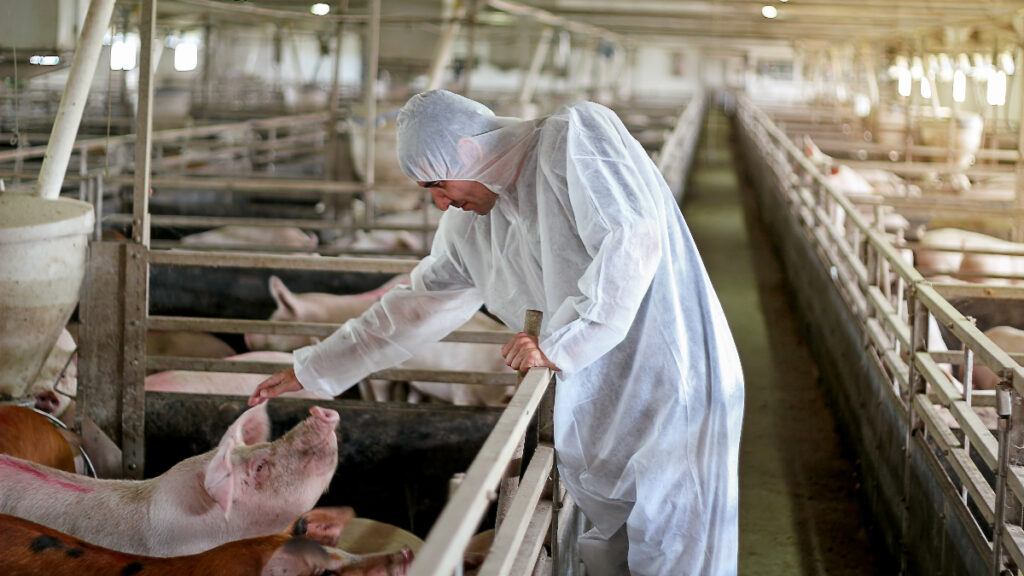
Most pandemics in the 21st century have not come from ‘wet markets’ but have rather come from avian or swine influenza, such as the 2009 Swine Flu outbreak, which killed nearly 300,000 people.
The World Health Organisation said: “This time around, we have been aided by pure good luck. The virus did not mutate during the pandemic to a more lethal form.”
The conditions pigs are kept in are ‘leading to more diseases becoming resistant to antibiotics and passing from pigs to humans, such as the pig strain of MRSA, ST398‘, explains Kenneil.
Unfortunately, much of the effort to keep pigs healthy is so that ‘your bacon remains affordable‘ completely ignoring the experience of the pigs themselves.
‘Burst the bubble’
The UK may be ahead of other countries in welfare terms. But this doesn’t mean animals are treated well.
It’s only relatively better than horrific conditions elsewhere.
“We frequently hear the assertion that the UK has some of the best welfare in the world. I have to burst that bubble,” Dr. Brough writes.
“Not only is the comparison to other nations inaccurate. But, it is also largely irrelevant, particularly when you consider that we import 60 percent of the pig meat consumed here.
“Does being better than atrocious automatically make us good? It certainly does not.”
Will things change?
“There is no political will to disturb a system that produces cheap food, so the NFU, Red Tractor, and DEFRA tacitly acquiesce to the existing situation where most intensive indoor farms routinely break the law,” says Kenneil.
This is despite the real threats to human health from future zoonotic pandemics.
“Even though more people are now becoming aware that intensive farming is certainly a contributing factor to the emergence and spread of zoonotic diseases,” says Dr. Gladkova.
She adds: “I doubt that this awareness is enough to shake the very solid (and, unfortunately, equally harmful) foundations of our meat production system.”
For the 10 million pigs farmed in the UK – especially those in the growing intensive farming system – their short lives of misery will continue unless demand for their flesh is brought to an end.
As Ed Winters says, the tree is rotten: “The only way to end cruelty to animals is to be vegan.”
